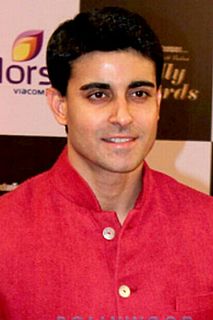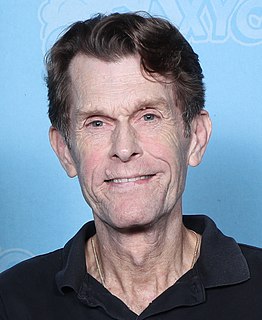A Quote by Gautam Rode
I believe that music videos give us an opportunity as actors to play a different character.
Quote Topics
Related Quotes
I'm very fortunate that I get asked to do very different kinds of roles and I realize how much I enjoy that. I enjoy the challenge of transformation. There are actors who play one character, or a certain kind of character, the whole of their lives. I really relish the opportunity to have the challenge to totally transform.
When I'm in the studio, I write the music, I play the different instruments, I produce it, I arrange it, and it's a self-indulgent exercise. It's the way I make my music. And when I'm acting, I get to leave myself behind, which is a relief. I get to collaborate with a director; I respect the director's medium and all the actors and actresses. So at the end of the day, it's about a character and it's about a director's vision. It's a really good balance for being so intense and alone in my personal process of making music.
Between New York and L.A., and all of us who are actors, I feel like we're just one big, cast repertory company, all running back and forth between the coasts and between different shows. There is a wealth of great character actors, who show up, here and there, on different shows. I love the fact that we're allowed to do that.
I think that what's important as a director is to give your actors the feeling that they're protected, the feeling of confidence, the feeling that if they make mistakes, then as a director, you'll know how to help them. If you're able to convey that, then the actors will give you wonderful performances. As well as the author, you have to write scenes that give the actors the opportunity to show what they're capable of.
I think film is a world of directors. Theater is a world of actors. Or, theater is for actors as cinema is for directors. I started in theater. Filming is as complete as directing film. In theater, you are there, you have a character, you have a play, you have a light, you have a set, you have an audience, and you're in control, and every night is different depending on you and the relationship with the other actors. It's as simple as that. So, you are given all the tools.
In the christian view, the ultimate evidence for the existence of God is Jesus Christ.? If there is a God, we characters in his play have to hope that he put some information about himself in the play. But Christians believe he did more than give us information. He wrote himself into the play as the main character in history, when Jesus was born in a manger and rose from the dead.
I think it would be self-indulgent to go, "Oh, I'm going to make this character different by giving him a quirk of some kind." I don't think that serves the story, particularly. But even very similar scenes with a different set of actors, a different set of circumstances, it starts to evolve as a different character.


































